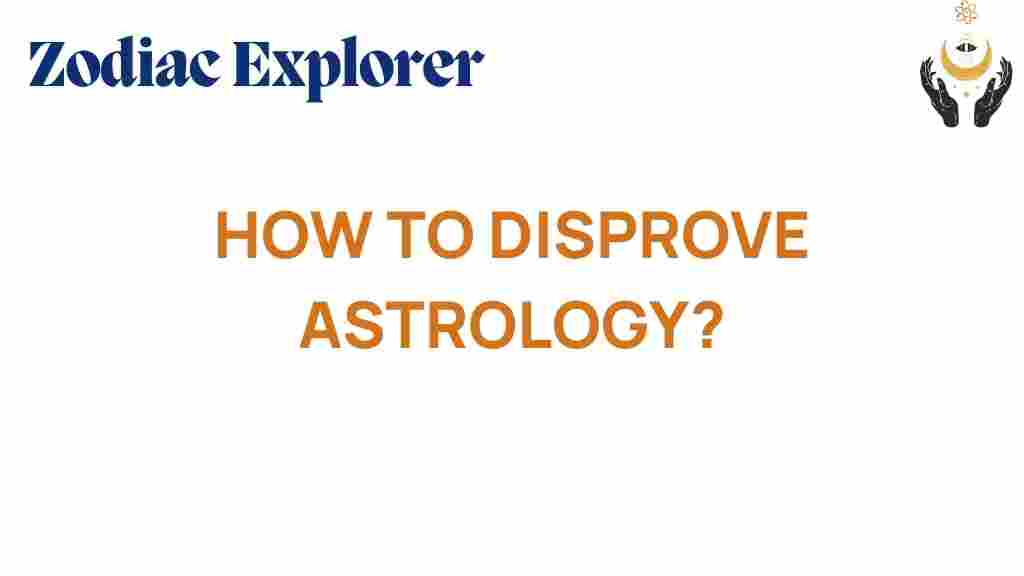Unraveling the Stars: How to Disprove Astrology’s Claims
Astrology has been a topic of fascination for centuries, captivating millions with its promises of insight into personality, relationships, and future events based on the positions of celestial bodies. However, as we delve deeper into the realm of skepticism and critical thinking, it becomes clear that astrology lacks the scientific credibility it often claims. In this article, we will explore how to effectively challenge astrology’s assertions using the scientific method, while emphasizing the importance of rationality in our belief systems.
The Allure of Astrology
Astrology appeals to many because it offers a sense of control over the chaotic nature of life. This ancient belief system posits that the positions of the stars and planets at the time of one’s birth influence their personality and life events. However, the reliance on astrology raises critical questions about the nature of evidence and the validity of claims made without scientific backing.
Understanding the Scientific Method
The scientific method is a systematic approach to understanding phenomena through observation, experimentation, and analysis. It involves several key steps:
- Observation: Identifying a phenomenon or claim.
- Hypothesis: Formulating a testable statement.
- Experimentation: Conducting tests to gather evidence.
- Analysis: Interpreting the results.
- Conclusion: Drawing conclusions based on the evidence.
In the context of astrology, we can apply the scientific method to assess its validity and uncover its flaws.
Step 1: Observing Astrology’s Claims
The first step in debunking astrology is to clearly outline its claims. Astrologers often assert the following:
- People born under the same zodiac sign share similar personality traits.
- The positions of celestial bodies influence life events.
- Horoscopes can predict future happenings based on astrological alignments.
These claims, while appealing, lack concrete evidence when scrutinized through a scientific lens.
Step 2: Formulating a Hypothesis
For each claim made by astrology, we can formulate a hypothesis to test its validity. For example:
- If astrology is true, then individuals born under the same zodiac sign should exhibit statistically similar personality traits.
- If astrology is true, then horoscopes should accurately predict events in the lives of individuals.
Step 3: Experimentation and Evidence Gathering
To test these hypotheses, we can conduct studies that compare the personality traits of individuals born under the same zodiac sign. Additionally, we can analyze the accuracy of horoscopes by comparing predictions to actual outcomes. Notable studies include:
- A 1985 study by Shawn Carlson published in the journal Proceedings of the National Academy of Sciences, which found no correlation between astrological profiles and personality assessments.
- Recent analyses of horoscope predictions and their outcomes that consistently reveal no significant accuracy above chance.
Step 4: Analyzing the Results
After conducting experiments, it is crucial to analyze the results objectively. In the case of astrology, studies have repeatedly shown:
- No consistent evidence supports the claim that zodiac signs correlate with personality traits.
- Horoscopes often rely on vague language, making them applicable to a wide audience, leading to confirmation bias.
These findings indicate a clear lack of support for astrological claims, aligning with the principles of rationality and evidence-based belief systems.
Troubleshooting Common Arguments in Favor of Astrology
Astrology proponents often present several arguments to defend their beliefs. Here’s how to address some common misconceptions:
Myth 1: Astrology is an Ancient Science
While astrology has historical significance, being ancient does not equate to validity. Many outdated beliefs, such as alchemy and phrenology, have been disproven by modern science. The passage of time does not guarantee accuracy.
Myth 2: Positive Experiences Validate Astrology
People often cite personal experiences as evidence for astrology. However, this falls into the trap of anecdotal evidence, which lacks scientific rigor. The human brain is prone to cognitive biases, such as the confirmation bias, where individuals remember instances that support their beliefs while ignoring contradictory evidence.
Myth 3: Astrology is Just a Tool for Reflection
Some argue that astrology serves as a tool for self-reflection. While introspection is valuable, it does not validate the underlying principles of astrology itself. Self-reflection can occur without attributing it to celestial events.
Conclusion: Embracing Rationality Over Belief
As we have unraveled the claims of astrology through the lens of the scientific method, it becomes evident that astrology lacks empirical support. While it may provide comfort and entertainment for some, we must prioritize critical thinking and evidence when forming our belief systems.
In a world filled with information, it is essential to scrutinize claims, challenge myths, and embrace rationality. By doing so, we can foster a deeper understanding of the universe and our place within it, free from the constraints of unfounded beliefs.
For those interested in exploring the fascinating world of science and skepticism further, consider visiting resources like The Skeptics Society for insightful articles and discussions.
Remember, the stars may be beautiful, but our understanding of them should be grounded in evidence and reason.
This article is in the category Myths and created by ZodiacExplorer Team
